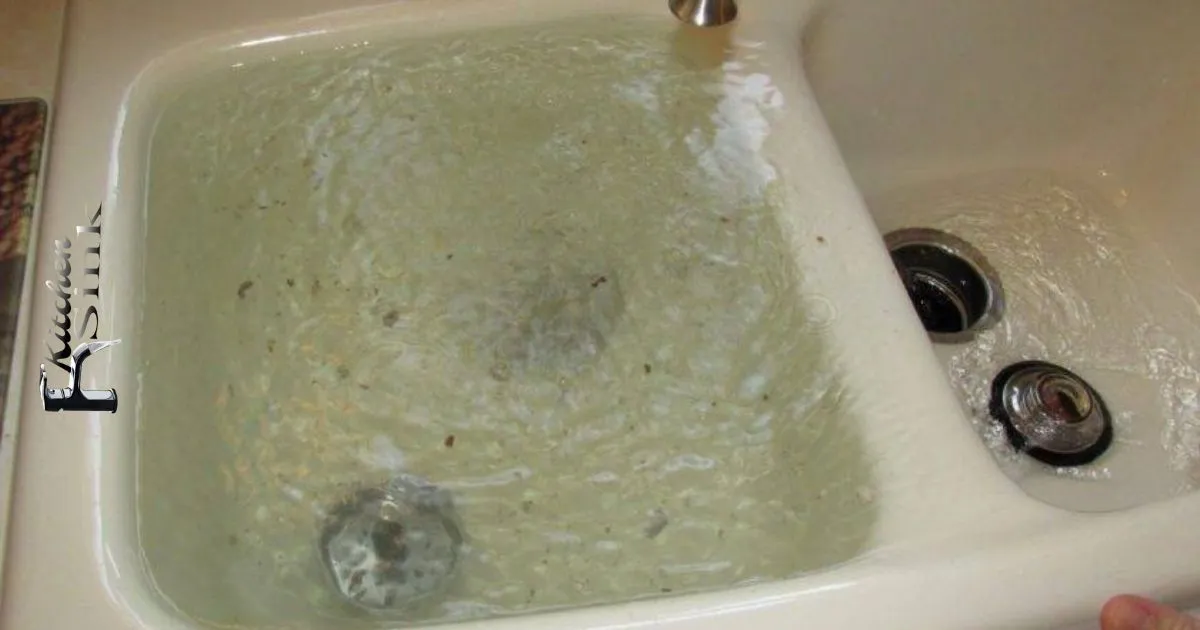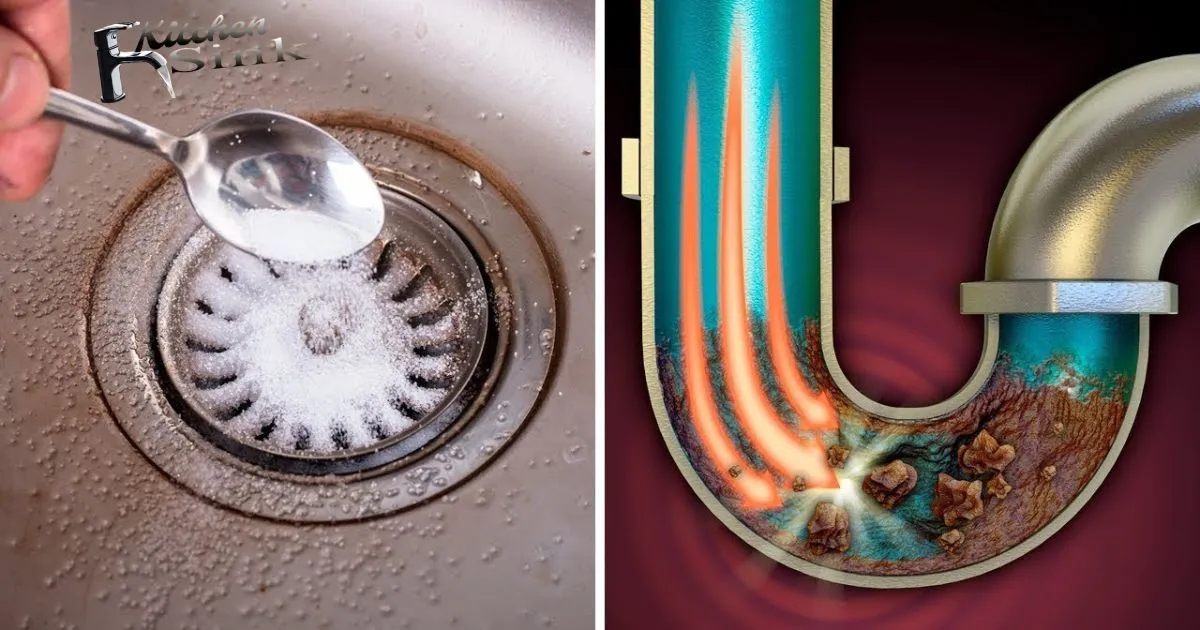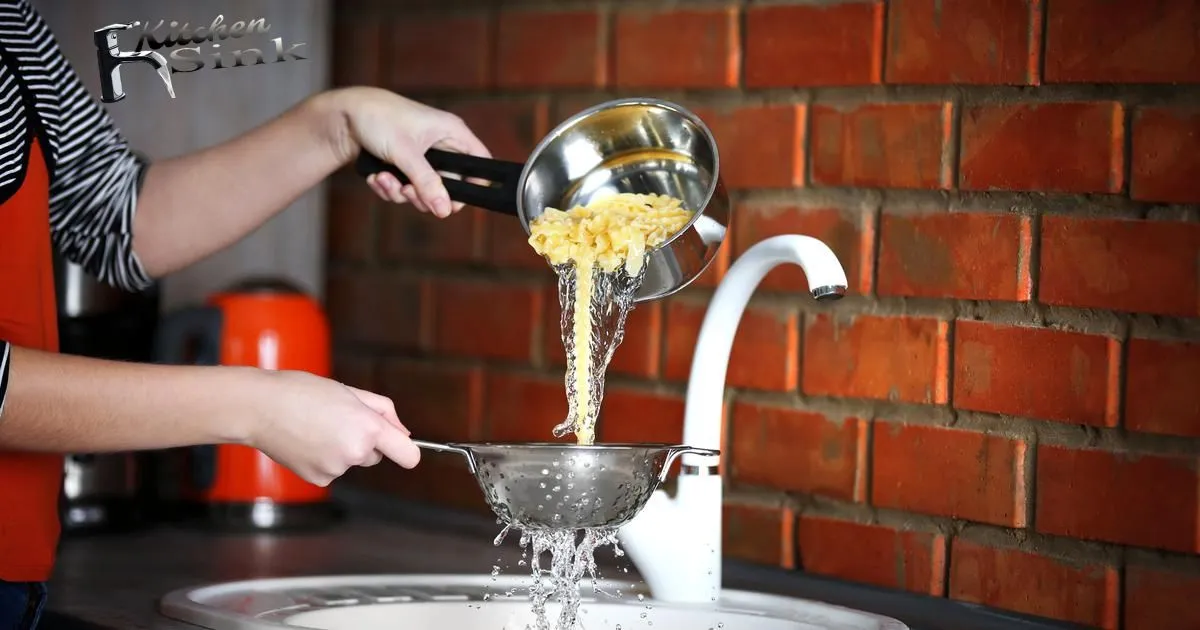A gurgling kitchen sink refers to air bubbles and water sounds coming from the drain pipes when water goes down the sink. This is often caused by a partial blockage in the drain pipe preventing water from draining smoothly.
How To Fix Gurgling Kitchen Sink? – This common plumbing issue can often be easily fixed at home without calling a plumber. Learning some simple drain cleaning techniques could save you money and frustration.
There are various reasons why kitchen sinks may start to gurgle. Buildup of grease, soap scum, food particles, and hair inside the pipes are common culprits. Clearing the clogs and cleaning the pipes is key to stopping annoying gurgling noises and backed up water. Simple methods like using a plunger, baking soda and vinegar, or a drain snake can help remove gunk and get your sink draining properly again.
Why Does My Kitchen Sink Gurgle?
A kitchen sink typically gurgles due to a partial blockage in the drain pipe or sewer line that prevents water from draining smoothly. As water tries to push through, air bubbles come up through the water, causing a gurgling sound. Grease, soap scum, hair, and food debris are common culprits of kitchen sink clogs.
causes gurgling in the kitchen sink
The main causes of a gurgling kitchen sink are partial drain clogs, full drain blockages, venting issues, and problems with the sewer line. Blockages prevent proper water flow, leading to air pressure building up as water tries to drain. This air then bubbles up through the water, making gurgling noises.
gurgling kitchen sink a problem
A gurgling kitchen sink indicates there is a drainage problem that needs to be addressed. While a minor partial clog may only cause occasional gurgling, it can quickly turn into a complete blockage and lead to water backing up. Left unchecked, clogs can also cause pipe damage over time.
gurgling sound indicate
The gurgling noises point to air bubbles coming up through the water in the drain, which usually means there is a partial blockage preventing proper water flow. It signifies drainage issues that will likely get worse if not properly addressed.
concerned about a gurgling kitchen sink
You should be concerned about a gurgling kitchen sink whenever the noise occurs frequently, seems to be getting louder, or is accompanied by slow draining water. This likely means the clog is getting worse. Persistent gurgling that continues after trying DIY drain cleaning methods also warrants calling in a professional plumber.
How To Diagnose The Cause of A Gurgling Kitchen Sink
A gurgling kitchen sink is usually caused by a partial blockage in the drain pipes. To diagnose, check if the gurgling happens when using other fixtures like a toilet or shower. Listen for where the gurgling is loudest to locate the clog. Also inspect under the sink for leaks, damage, or improper venting that allows air pockets to form.
some reasons for a gurgling kitchen sink
Common reasons for a gurgling kitchen sink drain include food buildup, grease, hair, soap residue, small objects falling down the drain, a damaged vent pipe, improper pipe installation allowing air pockets, or even a blockage further down the main sewer drain line. Any partial blockage prevents water from draining smoothly.
check where the blockage is located
To check where the kitchen sink blockage is located, listen for the loudest gurgling noises when running water. Also check if other drains in the house gurgle, which points to a main sewer line issue. Use a small camera snake to inspect the drain pipes under the sink and in other locations to pinpoint the clog.
tools can I use to diagnose the issue
A thorough examination using the Kitchen Sink Need A Vent approach can help identify and resolve any ventilation issues that might be contributing to the gurgling problem.
preventative steps can avoid gurgling in the future
Preventative steps include avoiding pouring fats or food down the sink, using strainers to catch food scraps, regularly snaking drains clear of debris, ensuring pipes are properly installed and vented, fixing any leaks quickly, and not overloading the drain with too much waste at once.
Unclogging A Gurgling Kitchen Sink Yourself
A gurgling kitchen sink indicates a partial clog. Before using harsh chemicals or tools, try a plunger to forcefully dislodge the clog. Position the plunger over the drain and plunge forcefully several times to loosen the clog. You can also boil water and carefully pour it down the drain to break up grease, or use a wire coat hanger to fish out debris.
plunger to fix a gurgling kitchen sink
A plunger is an effective first step to try and unclog a gurgling kitchen sink yourself. Plunge forcefully several times which can dislodge the clog without chemicals or tools. Ensure you have a tight seal over the drain to build pressure.
chemical drain cleaners stop a gurgling kitchen sink
Chemical drain cleaners containing lye or sulfuric acid can help dissolve organic matter clogs. However they are caustic, can damage pipes, and should be a last resort after trying a plunger. Follow directions carefully, never mix chemicals, and use protective equipment to avoid burns or exposure.
safe to use an auger for a gurgling kitchen sink
Using an auger can fix sink clogs. But augers can scratch pipes. Old pipes may then leak. So check pipe condition first. Wear gloves and eye protection. Turn power off beforehand. Insert slowly and gently twist, don’t force. If stuck, reverse auger carefully. Call a pro for deep blockages.
| Safety Step | Why |
| Check pipes | Avoid leaks from scratches |
| Wear gloves, glasses | Prevent cuts or splashes |
| Power off | Don’t risk electrocution |
| Insert slowly | Prevent pipe damage |
| Don’t force | Could get auger stuck |
| Reverse carefully | Damage if auger stuck |
| Call a pro | For tricky, deep clogs |
homemade solutions work for a gurgling kitchen sink
Boiling water, baking soda and vinegar, enzyme cleaners, and salt can help dissolve kitchen sink clogs without harsh chemicals. Mix 1/2 cup baking soda with 1/2 cup vinegar and pour down sink, cover and let sit 30 mins. Or pour 1/2 cup salt down the drain followed by boiling water to abrasively scrub the pipes. Enzyme cleaners also digest buildup.
Calling A Plumber For A Gurgling Kitchen Sink
You should call a plumber if you have tried DIY methods like plunging, snaking, or using drain cleaners and the gurgling persists. A plumber has specialized tools and expertise to fully diagnose and fix the underlying issue, which is likely a partial clog deeper in the pipes. They can also check if the gurgling extends to other drains, indicating a larger problem.
plumber for a gurgling kitchen sink
Don’t wait with a gurgling kitchen sink – call a plumber after trying some DIY unclogging solutions first. If the gurgling persists more than a couple days, gets louder, or is accompanied by foul odors, slow drainage, or backing up, call a pro right away before permanent damage happens.
methods will a plumber use to fix a gurgling kitchen sink
A plumber will first diagnose the issue then use methods like power augering, hydro jetting, pipe inspection cameras, and drain snakes to clear debris, grease, and soap buildup causing the clog. They may also check vent pipes for blockages preventing proper air flow.
cost to hire a plumber for a gurgling kitchen sink
The average cost to hire a plumber to fix a gurgling kitchen sink ranges from $100-$250, depending on the severity of the clog, if it extends to other drains, and how long the job takes. More complex repairs could run $500+. Get an estimate first.
prevent gurgling kitchen sink issues in the future
Prevent future gurgling and clogs by regularly pouring baking soda and vinegar down drains to break up grease, limiting food waste disposal, using drain strainers, avoiding harsh chemicals, and calling a plumber periodically for maintenance checks.
Preventing Future Gurgling Kitchen Sink Problems
To prevent future gurgling kitchen sink issues, the most important maintenance is to regularly clear debris and buildup from the drain. Food particles, grease, hair, and other debris can accumulate over time and cause partial or complete clogs.
Using a sink strainer basket and disposing food waste in the trash can help reduce buildup. Additionally, flushing drains weekly with hot water and baking soda or vinegar can help clear minor buildup before major clogs form. Garbage disposals should have cold water run during and after use to flush waste through the pipes. Avoid pouring fats, oils, and grease down the drain.
What items should never go down a kitchen sink drain?
Certain items should never be poured down a kitchen drain because they can clog pipes or damage the plumbing system. Grease, fats, and oils will stick to pipe walls and accumulate over time.
Allowing them to solidify into blockages. Food items like rice, pasta, egg shells, bones, and fibrous produce can also get caught in pipes. Other items to avoid include paper towels, dental floss, hair, sanitary products, cigarette butts, paper, rags, chemicals like paint or pesticides, and anything not designed to be flushed. These can snag on pipes or cause backup.
use a homemade drain cleaner
5 uses for homemade drain cleaners:
- Monthly – Pour baking soda and vinegar down sinks and drains once a month to break up grease and keep pipes clear.
- Preventative – Use a mix of salt, baking soda, and hot water weekly to help prevent future clogs from building up.
- Before events – Clean drains the day before having lots of guests or cooking large meals to allow for extra flow.
- With disposal – Run citrus rinds, ice cubes, and hot water after using the garbage disposal to freshen pipes.
- For odors – Flush drains with a homemade cleaner of lemon juice, vinegar, and boiling water to reduce bad smells from dirty pipes.
installing a garbage disposal reduce gurgling kitchen sink issues
Installing a garbage disposal can potentially reduce gurgling and drainage issues in a kitchen sink. The grinding mechanism breaks down scraps into tiny particles that easily wash down the drain. Without a disposal, food particles are more likely to accumulate into clogs.
A disposal isn’t a fix-all solution. Users must still avoid pouring fats and oils down the drain, as these will coat pipes and solidify. And some items like produce fibrous should still go in the trash. Using a disposal also requires more frequent drain cleaning to flush the additional waste. If used properly though, disposals can be a useful tool to reduce sink clogs.
Frequently Asked Question
What causes a gurgling kitchen sink?
A partial clog from food waste or built up grease causes air and water to escape through the drain slowly, creating a gurgling sound.
Can I fix it myself or do I need a plumber?
You can try plunging the drain or using a chemical drain cleaner first, but call a plumber if those methods don’t solve the gurgling.
Will hot water fix a gurgling kitchen sink?
Running very hot tap water can help dissolve grease buildup, but it’s just a temporary fix for a gurgling kitchen sink drain.
Is it safe to use drain cleaners to stop gurgling?
Drain cleaners are effective but toxic so follow all safety directions and never mix chemical types.
Do I have to replace pipes to permanently fix a gurgling sink?
Replacing corroded, misaligned, or improperly installed pipes is the only permanent solution for chronic gurgling sink issues.
Conclusion
A gurgling kitchen sink is often caused by a partial clog from food waste or debris buildup in the pipes. To fix this, first try plunging the drain and using a sink strainer to catch particles. Run hot water for 15 minutes to clear grease. Check under the sink for issues with the P-trap or air admittance valve too.
Drain cleaners with baking soda, vinegar or enzymes can break up clogs over time with weekly use. If DIY attempts fail, call a plumber to snake the drain; a professional auger can remove stubborn clogs. A gurgling noise means there is likely a partial blockage in the kitchen sink drain pipe.
Using a plunger, hot water, or chemical drain cleaners may clear a minor clog. But persistent gurgling indicates professional help is needed. A plumber can properly diagnose the issue with drain cameras and use an auger snake to fully clear any stuck-on grease or debris in the piping. Tackling any drain blockages quickly avoids bigger backup issues down the line.



